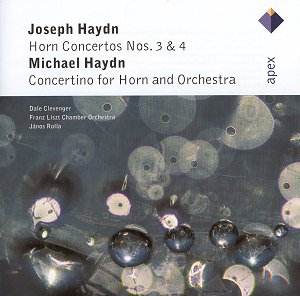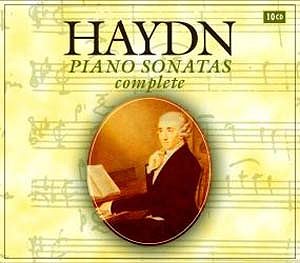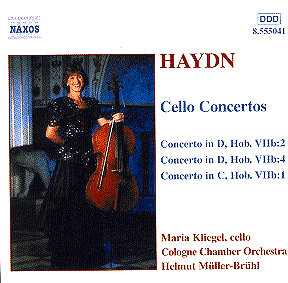 Composer: Joseph HAYDN (1732-1809), Michael HAYDN (1737-1806)
Composer: Joseph HAYDN (1732-1809), Michael HAYDN (1737-1806)
Works: Horn Concerto No.3 in D Hob. VIId/3, Horn Concerto No.4 in D Hob. VIId/4, Horn Concertino P134 (MH105)
Performers: Dale Clevenger, horn; Franz Liszt Chamber Orchestra; János Rolla, conductor
Recording: Recorded at Casino Zögernitz, Vienna in June 1983
Label: TELDEC APEX 0927 40825 2
The horn concertos of Joseph Haydn offer a vivid glimpse into the evolution of orchestral color and instrumental technique during the late 18th century. Composed for players recruited from military bands at the Esterházy court, these works emerged in a context where the horn was still grappling with the limitations of its valveless nature. Haydn’s engagement with the horn, particularly through the talents of Thaddäus Steinmüller and Johannes Knobloch, reflects a burgeoning interest in expanding the instrument’s expressive capacity beyond the fanfare-like figures that characterized much of its early repertoire. The present recording, featuring hornist Dale Clevenger with the Franz Liszt Chamber Orchestra under János Rolla, captures these concertos’ spirited charm and the exploratory ethos of their time.
Clevenger’s interpretation of Horn Concerto No.3 in D, Hob. VIId/3, is marked by a nuanced approach to its lyrical episodes, especially in the slow movement, where he deftly navigates the instrument’s lower register. This movement, laden with expressive potential, benefits from Clevenger’s ability to draw out rich tonal colors, creating an intimate dialogue with the orchestra. The Allegro, however, reveals some inconsistencies; while Clevenger’s phrasing is generally articulate, certain high notes approach a precarious edge, suggesting a need for greater assurance in the upper register. The cadenzas he employs, while inventive, occasionally stray from the stylistic integrity of Haydn’s original intentions, leaving one wishing for more adherence to the concerto’s classical clarity.
The second concerto, Horn Concerto No.4 in D, Hob. VIId/4, presents a work of slightly dubious authenticity, yet it nonetheless offers considerable delight in its spirited Allegro and the contrasting warmth of its slow movement. The orchestral support from the Franz Liszt Chamber Orchestra is commendable, particularly in their delicate rendering of the orchestral textures, which allow Clevenger’s horn to shine. The occasionally audible harpsichord continuo adds a historical resonance that underscores the ensemble’s commitment to period performance practices. This recording captures the balance well, although there are moments where the orchestral textures could have been more tightly woven to support the soloist’s lines.
The inclusion of Michael Haydn’s Horn Concertino, a work that exhibits a fascinating interplay of style with its three-movement structure, further enriches this collection. This piece, likely originating from Haydn’s early years in Salzburg, showcases a more exploratory harmonic language. The Larghetto’s introspective character allows Clevenger to display his lyrical capabilities, while the subsequent Allegro bursts forth with a buoyancy that feels reminiscent of his brother’s more famous works. The interplay between the soloist and the orchestra here feels particularly organic, with Rolla’s conducting providing a flexible framework that accommodates Clevenger’s interpretative choices.
Recording quality is generally robust, capturing the dynamic range of the horn with clarity and warmth. However, certain passages could benefit from a more focused engineering approach, as the interplay between the horn and the orchestra occasionally blurs, diminishing the clarity of Clevenger’s nuanced phrasing. Compared to other notable recordings of these works, such as those featuring Dennis Brain, Clevenger’s interpretations may not always reach the same level of effortless brilliance, yet he nonetheless brings a distinctive voice that is compelling in its own right.
The blend of Haydn’s innovative spirit and Clevenger’s virtuosic prowess culminates in a rewarding listening experience, one that allows both composers’ contributions to the horn repertoire to shine. While the performance does exhibit some technical challenges, Clevenger’s interpretative insights and the supportive orchestral backdrop create a vibrant homage to the horn’s development in the classical era. This recording stands as a testament to the enduring appeal of Haydn’s music, inviting listeners to explore the rich tapestry of sound that defines his horn concertos.

